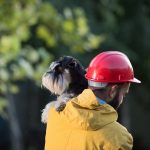Throughout the next 12 months the national qualifications and skills standards for jobs roles in training assistance dogs and small companion animal incident management will be reviewed. Industry will drive the process to review, update and develop the necessary skills standards for these sectors and job functions. We encourage your input. Follow the links below for further details about the projects and how you can be involved.
Small Companion Animal Incident Management Project
With an estimated 30.4 million pets across the country, people in Australia clearly understand the benefits of owning a pet.
The connection people have to their pets was highlighted during the 2019-20 Australian Bushfires, with many not wanting to leave their animals and even putting themselves at risk in efforts to save them. Following these events, the Royal Commission into National Natural Disaster Arrangements recommended ‘national consistency in training and competency standards’ to encourage resource and information sharing, and to enable ‘someone trained in one state or territory to work effectively in another’.
Industry experts will be consulted throughout this project to develop national skills standards to support the coordination and care of small companion animals during natural disasters. This will support the work of animal facility, emergency service, animal welfare and evacuation centre workers, who play an important role protecting people and pets during fires, floods and other natural events.
For more information, visit the project page

Trainers of Assistance Dogs Project
An improved understanding of the benefits of assistance dogs has seen an increased number of people accessing them for support, for a broader range of conditions (such as epilepsy, dementia, post-traumatic stress disorder, autism, mental ill-health, mobility and hearing and sight impairments).
Not for profit organisations such as Assistance Dogs Australia and Guide Dogs Australia have long waiting lists and more people are accessing the services of independent dog trainers. It is important people performing this work possess the skills to work with dogs and clients to achieve the best outcomes.
The expansion of assistance dogs into fields covered by the National Disability Insurance Scheme (NDIS) and other health streams has also increased demand for greater regulation and skilled delivery of assistance animal training. Industry has also called for nationally recognised training so that workers possess the core skills to prepare dogs for a variety of purposes and client needs.
Consultation will take place throughout this project to define the skills required to train dogs for different environments and tasks, as well as to train clients in caring for dogs. This will support industry in its efforts to have greater input, leadership and oversight into the training processes and accreditation for assistance dog trainers.
For more information, visit the project page.

